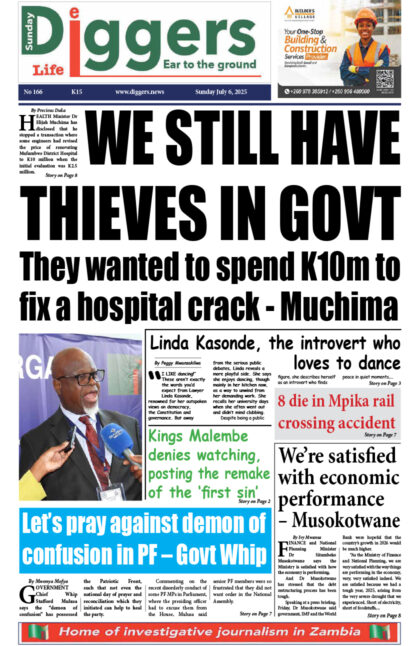THE Bankers’ Association of Zambia (BAZ) has welcomed the creation of the K8 billion COVID-19 bond, but has warned that it may cause liquidity challenges in the short-to-medium-term.
And the Association says interest rates on loan facilities linked to the Monetary Policy Rate (MPR) have been reduced by a margin of the corresponding 225 basis points.
In an interview, BAZ chief executive officer Leonard Mwanza projected that pension schemes and banks, among others, would opt to put money in the K8 billion bond because of the good yield, which, however, will negatively affect the country’s liquidity in the short-term.
“…So, in so far as it is meant to address those focus areas, and as long as we are able to raise funds in the market, the intention is good. But whilst doing so, we may have short-term liquidity problems because it means placements, the aggregators like pension houses, they may opt to put money into the COVID-19 bond, banks inclusive, because it’s an avenue where they can a good rate of return because bonds are now trading around 30 per cent. So, if you look at that, definitely, looking at the amount of money they want to raise, there might be a bit of market liquidity shake up in the medium to short-term. But in terms of the overall objective of raising money to pay those that government owes money, I think that focus area is well aligned,” Mwanza said.
“You need to realize that it’s got a specific focus, they (government) want to raise money to help those that are owed money, the third-party arrears, contractors and those that provided some goods and services to the government. You can imagine you have done business to the government and they are not paying you, it affects your cash flows. So, the bond in my understanding, is meant to raise money that will go towards unlocking arrears. Now, when you look at third-party recoveries, it’s a broader term because in there you will find insurance companies affected, micro-financial institutions affected, including commercial banks. So, if that is the main objective, its good because instead of a customer borrowing from the bank to sustain their cash flows and liquidity at risk, we can look forward to that point in time if the money is raised to at least help those contractors, banks, non-bank financial institutions, who are being owed money by government, at least then that liquidity can wind up to them manage their liquidity profiles.”
And Mwanza, a former Natsave managing director, added that the reduced MPR, effected by the Bank of Zambia (BoZ) last month, had translated into lower lending rates on loan facilities.
“Yes, all loans that are linked to the Monetary Policy Rate were reduced by 225 basis points. So, those benefits were directly passed on to the consumers or the borrowers. So long as the loans they had obtained were directly linked to the Monetary Policy Rate, that reduction has already been passed on to whoever may have borrowed. The average interest rate has also scaled down because remember before, the average interest rates were around 28 per cent but they’ve scaled down,” said Mwanza.
Last Monday, Cabinet approved, in principle, the establishment of a K8 billion economic stimulus package that will be financed through the issuance of the COVID-19 bond, with its allocation expected to go towards the needy areas of the country’s economy, including payment to retirees, contractors and suppliers.



















